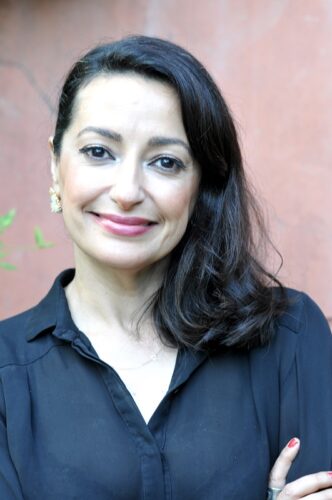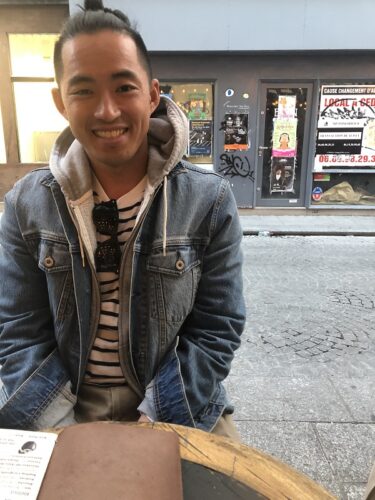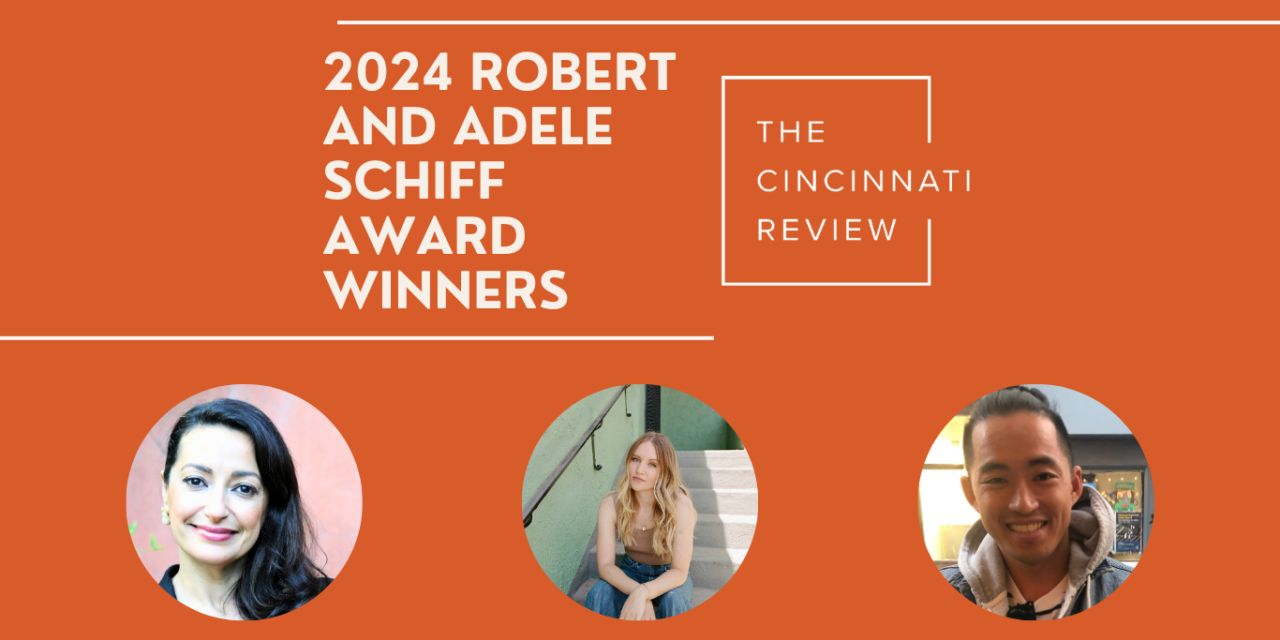Winners of the Sixteenth Annual Robert and Adele Schiff Awards
Leila Farjami for the poem “Bombs and Stars”
chosen by Erica Dawson
Erika Gallion for the essay “Paradise Is Ours”
chosen by Kristen Iversen
Patrick J. Zhou for the story “Pigboy and His Artificial Jesus”
chosen by Michael Griffith
Thank you to everyone who entered the contest! It was a joy to read your work. Farjami, Gallion, and Zhou will each receive a $1,000 prize, and their pieces will appear in the Spring 2025 issue of The Cincinnati Review. Read more below about the story behind the winning poem, essay, and story.
We’d like to thank Holli Carrell, Lily Davenport, and Sam Simas for their assistance during this year’s contest period. We also want to recognize all the honorable mentions:
Marguerite Alley
an chang joon
Sébastien Luc Butler
JR Fenn
W. J. Herbert
Linden Hibbert
Peter Kessler
Phuong Anh Le
Charlene Logan
Tori Malcangio
Madeline McFarland
Anna Mebel
Suphil Lee Park
Adam Peterson
Liz Schroeder
Alec Tiger
Charlotte Turnbull
Craig Van Rooyen
Serrina Zou
“Bombs and Stars” by Leila Farjami
Poetry Editor Erica Dawson: I always appreciate poems that act as moments of discovery for both writer and reader, poems that invite the reader to feel something they didn’t know they felt or could feel. “Bombs and Stars” stuns, doing just that. Through its twinning of the personal and political, as assistant editor Andy Sia notes, and its delicate yet detailed treatment of both the intimacy and grandeur of death, the poem carries us through the harsh truths of fear, survival, and grief.

Farjami on the winning poem: I have been writing about the psychological wounding of war for years, but this piece was generated a few months ago from a profoundly visceral experience of my childhood connection to birds. There were flocks of sparrows in every tree I looked at in the city where I had lived for thirteen years as a child before immigrating to the USA. I was indeed a death doula to a couple of them who had drowned in the backyard pond. This poem is a collage of reality, truthfulness, metaphor, and hyperbole at times since it requires multiple language devices to convey the complicated and existential landscape of a lived and living memory. The poem turns from personal to collective in the last stanza as it evolves without my interference. I have no answers to the questions asked by the speaker. In effect, it is the voice of a child who survives six years of nightly bombings and attempts to seam patches of her trauma where words may bear witness to its ever-present ghost. I am grateful and honored that this poem has found a beautiful refuge in The Cincinnati Review.
Leila Farjami is an Iranian American poet and psychotherapist in Los Angeles, California. Her poems have appeared in Diode Poetry Journal, Grey Sparrow, Nimrod, Silk Road Review, Subnivean, and many more; been nominated for the Pushcart Prize; and been anthologized. Visit her at leilafarjamipoet.com and follow her on Instagram at @leila_poetry.
“Paradise Is Ours” by Erika Gallion
Literary Nonfiction Editor Kristen Iversen: A poignant, painful, dramatic story, written in a compelling and lyrical style, “Paradise Is Ours” takes the reader on a journey into dark family secrets and an examination of how we search for meaning in the face of inescapably tragic events.

Gallion on the winning essay: Although barely any of the first draft remains, this essay was birthed in my undergraduate writing workshop in 2013 with the help of my writing mentor Joe Mackall. I have always been preoccupied with my complicated feelings toward my father’s alcoholism—why did the drinking seem to bother me in such a singular way? What exactly led him to his Busch beer every single day? In early drafts anger and resentment seeped through; later came empathy and curiosity.
At the core of my father’s addiction is family tragedy that he only talked about once: the bombing (via dynamite) of the Gallion family farmhouse in 1966, an act of supreme violence committed by my paternal grandfather. In 2021 I requested access to court documents and prison records, where I learned intimate details about the bombing and my grandfather. With this knowledge I came back to “Paradise Is Ours” and transformed the essay into what it is now. This essay is intensely about place, specifically Northeast Ohio and the rusted-out former glory of towns like it, and the power of money, or the strength of its lack. “Paradise Is Ours” is an attempt to reclaim joy for my father and safe, protected love for our family.
Erika Gallion (she/her/hers) is a Los Angeles–based writer originally from Canton, Ohio. Her published writing has appeared in Entropy, Angel City Review, Women’s Review of Books, The Racket, HerStry, Apricity (nominated for Best of the Net), NiftyLit, Always Crashing, and elsewhere. Gallion is the author of the Substack Matches Struck Unexpectedly in the Dark. For more information visit erikagallion.com and @fictitiouserika on Instagram.
“Pigboy and His Artificial Jesus” by Patrick J. Zhou
Fiction Editor Michael Griffith: Some stories start with a spectacular premise and then . . . well, figure that’s enough. Patrick Zhou’s “Pigboy and His Artificial Jesus,” set in a world in which people roam about accompanied by AI android Jesuses that vary widely in frills and technological sophistication, isn’t content to rest on its wildly imaginative starting point. Zhou builds on it beautifully, and the result—beyond all the inventive fun—is a moving portrait of a vulnerable young man.”

Zhou on the winning story: I once heard about a friend of a friend who started a “faith-based hedge fund.” Implying that Jesus was a capitalist was so deeply odious to me, but I didn’t know what to make of my disgust. Then, recently, given its growing ubiquity, artificial intelligence and its expansive potential became a more frequent point of discussion at my work.
And so begat the robot Jesuses.
As a primarily self-taught writer with a lot to learn, this was the most ambitious (and vulnerable) project I’ve attempted. What helped was that the words poured out so fast—the first sentence came to me this February in my bath while drinking a gin and tonic—it felt like the elusive “story only I could tell.” There’s a lot in here on politics, class, consumerism, and American religiosity and my hope was to avoid being screedy while retaining compassion, sincerity, and humor. At the end of the day, though, the story had to be carried on the shoulders of a lonely kid who found an unlikely and mysterious friend. I’m so honored the editorial team at The Cincinnati Review thought he and I were able to pull it all together.
Patrick J. Zhou lives in Washington, DC. A winner of the 2023 PEN/Dau Short Story Prize for Emerging Writers, he has (or will soon have) published stories in Quarterly West, Third Coast, hex literary, the minnesota review, and Carve. There are story notes and cat pictures at patrickjzhou.com.
To order the prizewinning issue (due out in May), check out our subscription options.











